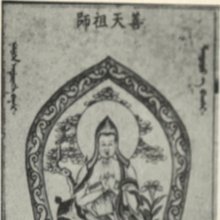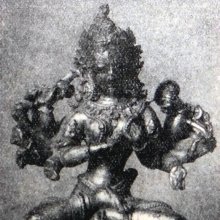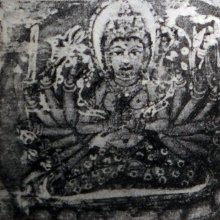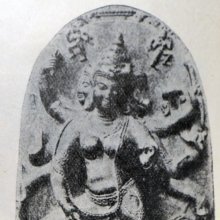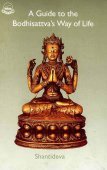Shantideva, Śāntideva, Śāntidevā: 7 definitions
Introduction:
Shantideva means something in Buddhism, Pali, Hinduism, Sanskrit, the history of ancient India. If you want to know the exact meaning, history, etymology or English translation of this term then check out the descriptions on this page. Add your comment or reference to a book if you want to contribute to this summary article.
The Sanskrit terms Śāntideva and Śāntidevā can be transliterated into English as Santideva or Shantideva, using the IAST transliteration scheme (?).
Images (photo gallery)
(+3 more images available)
In Hinduism
Purana and Itihasa (epic history)
Source: archive.org: Puranic EncyclopediaŚāntidevā (शान्तिदेवा).—(ŚĀNTIDEVĪ). Daughter of King Devaka. She was married by Vasudeva. (Vāyu Purāṇa, Chapter 96, Verse 130).
Source: Cologne Digital Sanskrit Dictionaries: The Purana IndexŚāntidevā (शान्तिदेवा).—A daughter of Devaka, and a queen of Vasudeva.*
- * Bhāgavata-purāṇa IX. 24. 23 and 50; Brahmāṇḍa-purāṇa III. 71. 131 and 62; Vāyu-purāṇa 96. 130; Viṣṇu-purāṇa IV. 14. 18.

The Purana (पुराण, purāṇas) refers to Sanskrit literature preserving ancient India’s vast cultural history, including historical legends, religious ceremonies, various arts and sciences. The eighteen mahapuranas total over 400,000 shlokas (metrical couplets) and date to at least several centuries BCE.
General definition (in Hinduism)
Source: World Philosophy: HinduismŚāntideva (8th century CE) is among the most revered thinkers for Tibetan Buddhists, and one of the most important Buddhist ethicists. His works attempt to found a good Buddhist life on metaphysical questions of free will, emptiness and self, based on the Madhyamaka metaphysics of Nāgārjuna.
In Buddhism
Tibetan Buddhism (Vajrayana or tantric Buddhism)
Source: Wisdomlib Libary: VajrayanaŚāntideva or Bhusuku is the name of a mahāsiddha, of which eighty-four in total are recognized in Vajrayāna (tantric buddhism). His title is “the idle monk”. He lived somewhere between the 8th and the 12th century AD.
These mahāsiddhas (e.g., Śāntideva) are defined according to the Abhayadatta Sri (possibly Abhayākaragupta) tradition. Its textual origin traces to the 11th century caturāsiti-siddha-pravṛtti, or “the lives of the eighty-four siddhas”, of which only Tibetan translations remains. Śāntideva (and other Mahāsiddhas) are the ancient propounders of the textual tradition of tantric or Vajrayana Buddhism.

Tibetan Buddhism includes schools such as Nyingma, Kadampa, Kagyu and Gelug. Their primary canon of literature is divided in two broad categories: The Kangyur, which consists of Buddha’s words, and the Tengyur, which includes commentaries from various sources. Esotericism and tantra techniques (vajrayāna) are collected indepently.
India history and geography
Source: archive.org: Personal and geographical names in the Gupta inscriptionsŚāntideva (शान्तिदेव) is an example of a name based on some sect mentioned in the Gupta inscriptions. Various names indicated Buddhist or Jain sects. The Gupta empire (r. 3rd-century CE), founded by Śrī Gupta, covered much of ancient India and embraced the Dharmic religions such as Hinduism, Buddhism and Jainism. Derivation of personal names (e.g., Śāntideva) during the rule of the Guptas followed patterns such as tribes, places, rivers and mountains.

The history of India traces the identification of countries, villages, towns and other regions of India, as well as mythology, zoology, royal dynasties, rulers, tribes, local festivities and traditions and regional languages. Ancient India enjoyed religious freedom and encourages the path of Dharma, a concept common to Buddhism, Hinduism, and Jainism.
Languages of India and abroad
Sanskrit dictionary
Source: Cologne Digital Sanskrit Dictionaries: Monier-Williams Sanskrit-English Dictionary1) Śāntideva (शान्तिदेव):—[=śānti-deva] [from śānti > śānta] m. Name of a man, [Buddhist literature]
2) [v.s. ...] f(ā, ī). (ā [Harivaṃśa; Purāṇa], or ī [Viṣṇu-purāṇa]) Name of a daughter of Devaka (and one of Vasu-deva’s wives).
[Sanskrit to German]
Sanskrit, also spelled संस्कृतम् (saṃskṛtam), is an ancient language of India commonly seen as the grandmother of the Indo-European language family (even English!). Closely allied with Prakrit and Pali, Sanskrit is more exhaustive in both grammar and terms and has the most extensive collection of literature in the world, greatly surpassing its sister-languages Greek and Latin.
See also (Relevant definitions)
Partial matches: Deva, Shanti, Teva.
Full-text (+9): Bodhisattvacaryavatara, Jayadeva, Pratishruta, Prashama, Janastambha, Shantidevi, Shrama, Bodhicaryavatara, Supushpachandra, Sherab, Kshanti, Tsondru, Tsultrim, Zopa, Jinpa, Samten, Alatacakra, Kukuravamsha, Bodhisattvapratimoksha, Akashapushpa.
Relevant text
Search found 21 books and stories containing Shantideva, Śānti-deva, Santi-deva, Śāntideva, Śāntidevā, Santideva, Shanti-deva; (plurals include: Shantidevas, devas, Śāntidevas, Śāntidevās, Santidevas). You can also click to the full overview containing English textual excerpts. Below are direct links for the most relevant articles:
Bodhisattvacharyavatara (by Andreas Kretschmar)
The Brahma Purana (by G. P. Bhatt)
Puranic encyclopaedia (by Vettam Mani)
Bodhicaryāvatāra (by Śāntideva)
Harivamsha Purana (by Manmatha Nath Dutt)
Chapter 35 - Vasudeva’s Family < [Book 1 - Harivamsa Parva]
Chapter 37 - An Account of Vabhru’s Family < [Book 1 - Harivamsa Parva]
Related products
